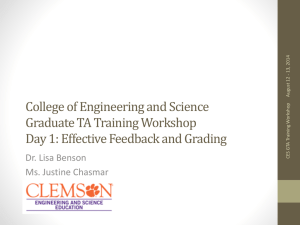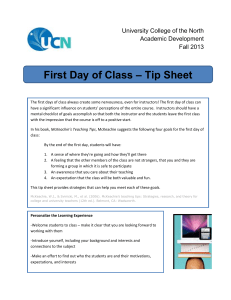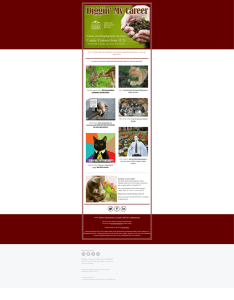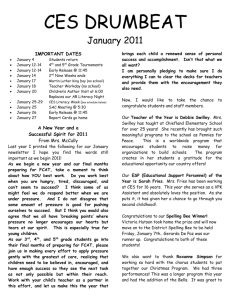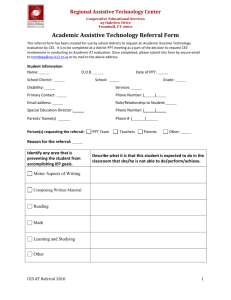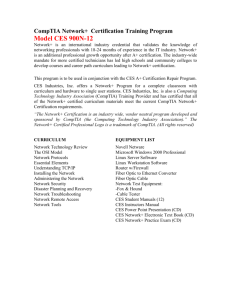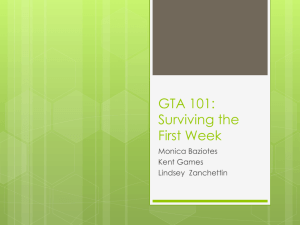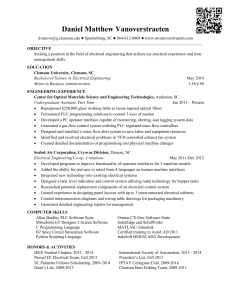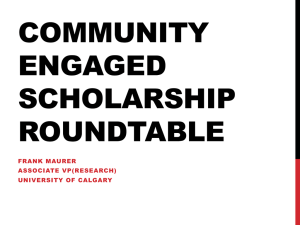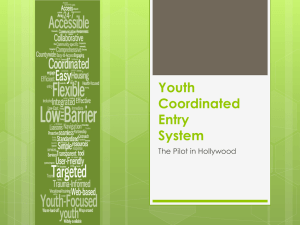Graduate Teaching Assistant Training Workshop
advertisement
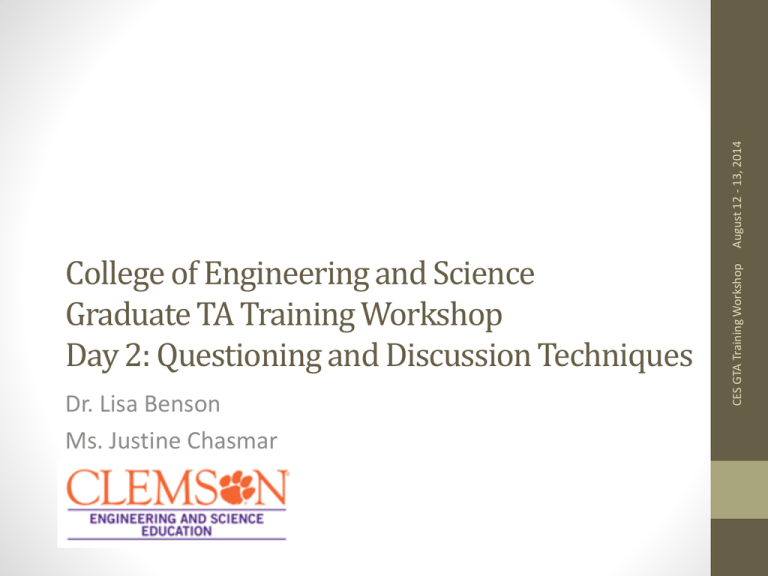
August 12 - 13, 2014 Dr. Lisa Benson Ms. Justine Chasmar CES GTA Training Workshop College of Engineering and Science Graduate TA Training Workshop Day 2: Questioning and Discussion Techniques When assessing learning: • Learning is more important than grades • Tests and other assessments should be learning experiences as well as evaluation devices • Providing feedback is more important than assigning a grade • Avoid evaluation devices that increase anxiety and competition From McKeachie and Svinicki, 2005 (pg. 84-85) Formative assessments give ongoing feedback on students’ understanding, for both teacher and student. • Guided inquiry questions • What’s the next step? • How could you do this problem differently? • Why is this model important? • Feedback on drafts • Minute papers – top 3 concepts, ”muddiest point”, etc. • Idea: Ask what they feel they’d need to study if there was a test tomorrow Not so effective formative feedback • “Any questions?” • Waiting until the end of the semester • Assuming all students understand what’s going on in the class • Assuming all students know how to study CES GTA Training Workshop August 12 - 13, 2014 Ask questions that move students beyond basic memorization of definitions Designing questions based on the “Rigor/Relevance Framework”* How are these similar/different? How is this like ___? What’s another way we could explain this? What are some reasons that ___? Why did ___ changes occur? What is a better solution to ___? How would you defend your position about that? How would you design a ___ to ___? Can you see a possible solution to ___? How could you teach this to others? If you had access to all resources, how would you deal with ___? What innovative uses can you think of for ___? What is/are ___? How many ___? How do/does ___? What did you observe ___? What else can you say about ___? What does it mean ___? Where will you use this knowledge? How does this relate to your experiences? What observations relate to ___? *Adapted from the International Center for Leadership in Education (http://www.leadered.com/) Asking questions that generate discussions Prepare questions—Develop thought-provoking questions as you prepare the content for class Play with the questions— Post questions on a slide or the board; open class with a question and revisit/answer it at the end of class; ask a question repeatedly across several sessions with multiple possible answers discussed before a “good” or “right” answer is identified. Preserve good questions—Save questions that generate interest, thoughtful responses, and good discussion along with the course materials for that day. Ask questions that you don’t know the answer to—This lets students know that you still have things to learn and can possibly learn them from your students; it may motivate them to ask better questions! Ask questions you can’t answer—Unanswered questions currently being confronted within your field are inherently more interesting than those that have been answered. Don’t ask open-ended questions when you know the answer you’re looking for—Don’t play the “try to guess the answer I have in mind” game; it reinforces the idea that questions have only one right answer. From Faculty Focus, May 28, 2014, The Art of Asking Questions by Maryellen Weimer CES GTA Training Workshop • When a student asks a question, instead of giving the answer, give the information needed to find the answer, then ask the class. • When students answer a question, always get them to include the “because” clause, telling why their answer is correct and how they know it is true. This will let you see misconceptions in even “correct” answers. • Leading questions are needed to a certain extent, but be careful of leading students directly to an answer and then thinking that they’ve “got it.” Have students rephrase the answer to make sure they are not just repeating information back to you. August 12 - 13, 2014 More tips on asking good questions Other ways to get formative feedback • Conduct a “Student Interest Inventory” early on, to learn about students’ subject-specific knowledge and how they like to learn • Survey students after the first exam to see how they prepared for it and to find out whether their grades matched expectations • Share feedback with students when you’re ready to implement changes based on their input • Nilson, Linda (2010). “Outcomes-Centered Course Design”, Ch. 2 in Teaching at Its Best, Third Edition, Jossey-Bass: San Francisco, CA. Also check out Linda Nilson’s workshops and other resources through the Office of Teaching Effectiveness and Innovation: http://www.clemson.edu/OTEI/ • More tips and resources on questioning and discussion points are available on the Clemson University College of Engineering and Science Graduate TA Training website: http://www.clemson.edu/ces/research/graduatestudies/current-students/gta-training/index.html CES GTA Training Workshop • McKeachie, W. J. and Svinicki, M. Teaching Tips: Strategies, research, and theory for college and university teachers, Houghton Mifflin, 2005. August 12 - 13, 2014 Further reading:
